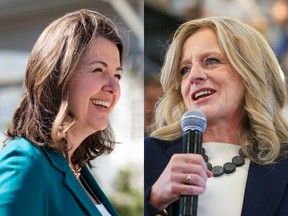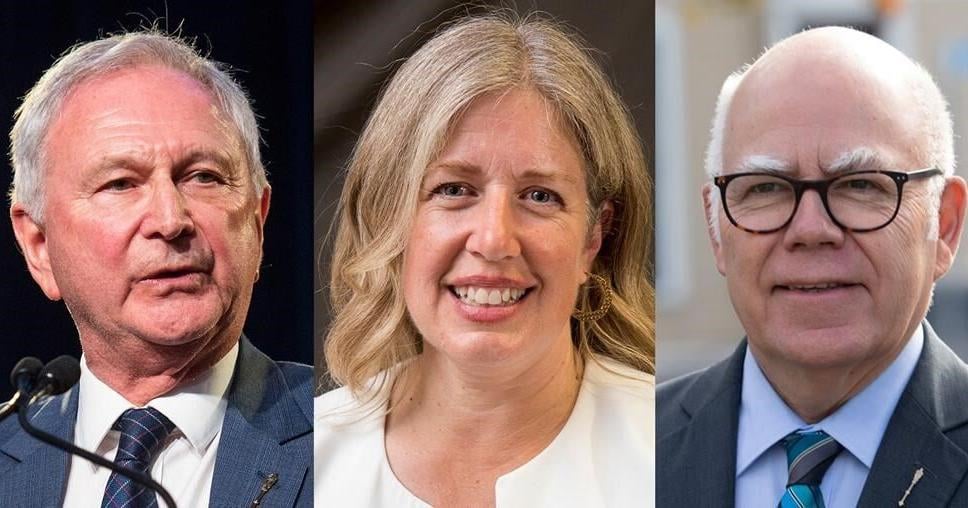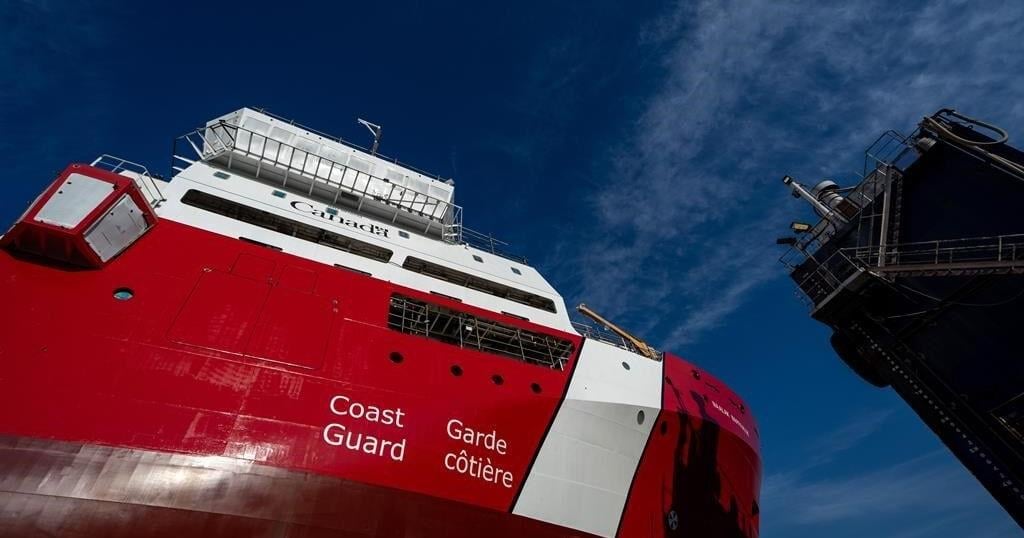Four years ago, when the election writ dropped for the 2019 campaign, Alberta’s economy was tilting on a different axis — a world before COVID-19, soaring inflation or the return of US$100-a-barrel oil.
Economy
Alberta’s economy no longer plays starring role, but still key in 2023 election

On Monday, as UCP Leader Danielle Smith and NDP Leader Rachel Notley held separate Calgary events and officially kicked off the 2023 election campaign for the May 29 vote, the provincial economy is in a vastly different place, and both parties tried to burnish their credentials while lambasting the other’s record.
“It was all about the economy in 2019. That is not the case now,” Mount Royal University political scientist Duane Bratt said Monday.
“Those economic circumstances are completely different, and that affects the politics.”
Today, the economy across Canada is rebounding from the pandemic, while rising interest rates and the rising cost of living are critical consumer concerns. Oil prices are now hovering around $75 a barrel.
The Trans Mountain project is more than 80 per cent complete — although its price tag has soared into a stratosphere at $30.9 billion — and oil output in Alberta averaged record levels of production at 3.7 million barrels per day (bpd) last year.
However, Keystone XL is long since dead and buried, costing the Alberta government an estimated $1.3 billion after its investment was lost when the project was nixed by U.S. President Joe Biden.

After a robust 2022, Alberta’s economy continues to expand, although it’s expected to slow down this year to 2.1 per cent growth, followed by 2.8 per cent in 2024, the Conference Board of Canada forecasts.
“In our underlying forecast, we do see Alberta as kind of the stronghold for Canada in the next year,” said Pedro Antunes, the board’s chief economist.
“That’s, in large part, because Alberta is still really recovering from what has been a long, drawn out, almost recessionary period.”
But energy sector investment has gone up and drilling activity was strong during the winter months.
Another key economic force in the province today is the strong level of population growth, fuelled by rising immigration and interprovincial migration over the past year, said Alberta Central chief economist Charles St-Arnaud.
Alberta added more than 45,000 people in the final three months of last year, with a net increase of more than 29,000 new residents from international migration, and 11,000 people moving from other provinces.
“The fact our population is growing by about three per cent year over year is putting a lot of momentum into our growth,” he said.
“That has a spillover on the rest of the economy.”
However, wage growth has lagged the rest of the country recently, St-Arnaud noted.
The province’s unemployment rate stood at 5.7 per cent in March, down a half-a-percentage point from a year earlier, but it’s still above the national rate of five per cent.
With new investments expected to flow into promising areas such as hydrogen, carbon capture projects and agricultural technology, companies need to fill open positions — and there’s a need for the province to invest in post-secondary institutions and re-skilling workers, said Adam Legge, president of the Business Council of Alberta.
“People and talent and skills are the No. 1 issue for our members and most companies I talk to,” he said.
“We have shortages now and we will have even more shortages if we’re trying to make (these) significant investments.”
On the opening day of the 2023 election, economic and pocketbook issues did surface on the campaign trail. Smith announced the UCP will create a new eight per cent income tax bracket — beginning next year — on income earned under $60,000 annually, with people making above that rate saving up to $760 a year.
Those earning less will see a 20 per cent cut to their provincial taxes.
“We have done an incredible amount of work over the last four years to rebuild confidence in our Alberta economy and it’s working,” Smith told reporters.
“With an NDP government, Albertans will see real action to grow and diversify our economy,” she said. “Diversification is an absolute necessity.”
The state of the economy may not play the same starring role as it did four years ago. Yet, given the importance of attracting investment and creating jobs for the future, it will remain a key campaign issue over the next four weeks.
Chris Varcoe is a Calgary Herald columnist.

Economy
Construction wraps on indoor supervised site for people who inhale drugs in Vancouver

VANCOUVER – Supervised injection sites are saving the lives of drug users everyday, but the same support is not being offered to people who inhale illicit drugs, the head of the BC Centre for Excellence in HIV/AIDS says.
Dr. Julio Montaner said the construction of Vancouver’s first indoor supervised site for people who inhale drugs comes as the percentage of people who die from smoking drugs continues to climb.
The location in the Downtown Eastside at the Hope to Health Research and Innovation Centre was unveiled Wednesday after construction was complete, and Montaner said people could start using the specialized rooms in a matter of weeks after final approvals from the city and federal government.
“If we don’t create mechanisms for these individuals to be able to use safely and engage with the medical system, and generate points of entry into the medical system, we will never be able to solve the problem,” he said.
“Now, I’m not here to tell you that we will fix it tomorrow, but denying it or ignoring it, or throw it under the bus, or under the carpet is no way to fix it, so we need to take proactive action.”
Nearly two-thirds of overdose deaths in British Columbia in 2023 came after smoking illicit drugs, yet only 40 per cent of supervised consumption sites in the province offer a safe place to smoke, often outdoors, in a tent.
The centre has been running a supervised injection site for years which sees more than a thousand people monthly and last month resuscitated five people who were overdosing.
The new facilities offer indoor, individual, negative-pressure rooms that allow fresh air to circulate and can clear out smoke in 30 to 60 seconds while users are monitored by trained nurses.
Advocates calling for more supervised inhalation sites have previously said the rules for setting up sites are overly complicated at a time when the province is facing an overdose crisis.
More than 15,000 people have died of overdoses since the public health emergency was declared in B.C. in April 2016.
Kate Salters, a senior researcher at the centre, said they worked with mechanical and chemical engineers to make sure the site is up to code and abidies by the highest standard of occupational health and safety.
“This is just another tool in our tool box to make sure that we’re offering life-saving services to those who are using drugs,” she said.
Montaner acknowledged the process to get the site up and running took “an inordinate amount of time,” but said the centre worked hard to follow all regulations.
“We feel that doing this right, with appropriate scientific background, in a medically supervised environment, etc, etc, allows us to derive the data that ultimately will be sufficiently convincing for not just our leaders, but also the leaders across the country and across the world, to embrace the strategies that we are trying to develop.” he said.
Montaner said building the facility was possible thanks to a single $4-million donation from a longtime supporter.
Construction finished with less than a week before the launch of the next provincial election campaign and within a year of the next federal election.
Montaner said he is concerned about “some of the things that have been said publicly by some of the political leaders in the province and in the country.”
“We want to bring awareness to the people that this is a serious undertaking. This is a very massive investment, and we need to protect it for the benefit of people who are unfortunately drug dependent.” he said.
This report by The Canadian Press was first published Sept. 18, 2024.
The Canadian Press. All rights reserved.
Economy
N.B. election: Parties’ answers on treaty rights, taxes, Indigenous participation

FREDERICTON – The six chiefs of the Wolastoqey Nation in New Brunswick distributed a survey on Indigenous issues to political parties ahead of the provincial election, which is scheduled to kick off Thursday. Here are some of the answers from the Progressive Conservative, Liberal and Green parties.
Q: How does your party plan to demonstrate a renewed commitment to recognizing our joint treaty responsibilities and acknowledging that the lands and waters of this territory remain unceded?
Progressive Conservative: The party respectfully disagrees with the assertion that land title has been unceded. This is a legal question that has not been determined by the courts.
Liberal: When we form government, the first conversations the premier-designate will have is with First Nations leaders. We will publicly and explicitly acknowledge your treaty rights, and our joint responsibility as treaty people.
Green: The Green Party acknowledges that New Brunswick is situated on the unceded and unsurrendered territories of the Wolastoqiyik, Mi’kmaq and Peskotomuhkati peoples, covered by the Treaties of Peace and Friendship. Our party is committed to establishing true nation-to-nation relationships with First Nations, grounded in mutual respect and co-operation as the treaties intended.
Q: How does your party propose to approach the issue of provincial tax agreements with First Nations?
Progressive Conservative: The government of New Brunswick operates in a balanced and fair manner with all organizations, institutions and local governments that represent the citizens of this province, including First Nations. Therefore, we cannot offer tax agreements that do not demonstrate a benefit to all citizens.
Liberal: Recent discussions with First Nations chiefs shed light on the gaps that existed in the previous provincial tax agreements with First Nations. Our party is committed to negotiating and establishing new tax agreements with First Nations that address the local needs and priorities and ensure all parties have a fair deal.
Green: The Green Party is committed to fostering a respectful relationship with First Nations in New Brunswick and strongly opposes Premier Blaine Higgs’s decision to end tax-sharing agreements. We believe reinstating these agreements is crucial for supporting the economic development and job creation in First Nation communities.
Q: How will your party ensure more meaningful participation of Indigenous communities in provincial land use and resource management decision-making?
Progressive Conservative: The government of New Brunswick has invested significant resources in developing a robust duty to consult and engagement process. We are interested in fully involving First Nations in the development of natural resources, including natural gas development. We believe that the development of natural gas is better for the environment — because it allows for the shutdown of coal-fired power plants all over the globe — and it allows for a meaningful step along the path to reconciliation.
Liberal: Our party is focused on building strong relations with First Nations and their representatives based on mutual respect and a nation-to-nation relationship, with a shared understanding of treaty obligations and a recognition of your rights. This includes having First Nations at the table and engaged on all files, including land-use and resource management.
Green: We will develop a new Crown lands management framework with First Nations, focusing on shared management that respects the Peace and Friendship Treaties. We will enhance consultation by developing parameters for meaningful consultation with First Nations that will include a dispute resolution mechanism, so the courts become the last resort, not the default in the face of disagreements.
This report by The Canadian Press was first published Sept. 18, 2024.
The Canadian Press. All rights reserved.
Economy
Canadian Coast Guard crew member lost at sea off Newfoundland

ST. JOHN’S, N.L. – A crew member of a Canadian Coast Guard ship has been lost at sea off southern Newfoundland.
The agency said in a release Wednesday that an extensive search and rescue effort for the man was ended Tuesday evening.
He was reported missing on Monday morning when the CCGS Vincent Massey arrived in St. John’s, N.L.
The coast guard says there was an “immediate” search on the vessel for the crew member and when he wasn’t located the sea and air search began.
Wednesday’s announcement said the agency was “devastated to confirm” the crew member had been lost at sea, adding that decisions to end searches are “never taken lightly.”
The coast guard says the employee was last seen on board Sunday evening as the vessel sailed along the northeast coast of Newfoundland.
Spokeswoman Kariane Charron says no other details are being provided at this time and that the RCMP will be investigating the matter as a missing person case.
This report by The Canadian Press was first published Sept. 18, 2024.
The Canadian Press. All rights reserved.
-

 News2 hours ago
News2 hours agoSleep Country shareholders approve sale to Fairfax Financial
-

 News2 hours ago
News2 hours agoNurse-patient ratios at B.C. hospitals set to expand in fall, says health minister
-

 News2 hours ago
News2 hours agoAlberta Premier Smith aims to help fund private school construction
-

 News2 hours ago
News2 hours agoHealth Minister Mark Holland appeals to Senate not to amend pharmacare bill
-

 Economy2 hours ago
Economy2 hours agoN.B. election: Parties’ answers on treaty rights, taxes, Indigenous participation
-

 News2 hours ago
News2 hours agoSecond-half goals lift defending MLS champion Columbus past Toronto FC
-

 Economy2 hours ago
Economy2 hours agoConstruction wraps on indoor supervised site for people who inhale drugs in Vancouver
-

 News2 hours ago
News2 hours agoFirst-degree murder charge in death of five-year-old Quebec boy: Crown





















